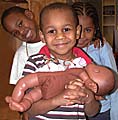SEL Parent Workshops: How Group Dynamics Enhance Problem-Solving and Parenting Skills

Check out our blog for social-emotional learning articles, news, and more!
 Gross, D., Fogg, L., Webster-Stratton, C., Garvey, C., W., J., & Grady, J. (2003). Parent Training of Toddlers in Day Care in Low-Income Urban Communities. Journal of Consulting and Clinical Psychology, 71(2), 261-278.
Gross, D., Fogg, L., Webster-Stratton, C., Garvey, C., W., J., & Grady, J. (2003). Parent Training of Toddlers in Day Care in Low-Income Urban Communities. Journal of Consulting and Clinical Psychology, 71(2), 261-278.
There is substantial evidence that improving parenting skills through parent training programs can significantly reduce the development and persistence of conduct problems and improve the quality of parent-child relationships (Kazdin, 1997; McMahon, 1999; Serketich & Dumas, 1996; Tucker & Gross, 1997). Specifically, when parents limit their use of coercive child management strategies (e.g., yelling, hitting, and verbal aggression) and increase their use of positive, supportive responses (e.g., encouragement, praise, and physically positive behaviors), child conduct problems and parenting self-efficacy significantly improve. These positive outcomes have mostly been achieved with early schoolaged children and adolescents. However, those findings have led to increasing interest in providing training for parents when their children are toddlers and preschoolers, before child conduct problems become firmly entrenched and more difficult to treat (Wakschlag & Keenan, 2001; Yoshikawa, 1994).
The authors tested a 12-week parent training program with parents (n=208) and teachers (n=77) of 2-3 year olds in day care centers serving low-income families of color in Chicago. Eleven centers were randomly assigned to one of four conditions: (a) parent and teacher training (PT + TT), (b) parent training (PT), (c) teacher training (TT), and (d) waiting-list control (C). After controlling for parent stress, PT and PT + TT parents reported higher self-efficacy and less coercive discipline and were observed to have more positive behaviors than C and TT parents. Among toddlers in high-risk behavior problem groups, toddlers in the experimental conditions showed greater improvement than controls. Most effects were retained one year later. Benefits were greatest when parents directly received training.





